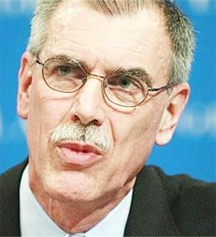WASHINGTON, (Reuters) – The Obama administration’s top courtroom lawyer made an impassioned plea yesterday for the Supreme Court to save President Barack Obama’s healthcare law, capping three days of historic arguments that left it unclear how the nine justices would rule.

Having peppered lawyers for and against the law with questions for more than six hours over the three days, the justices withdrew to their chambers to begin up to three months of deliberation expected to yield a decision by late June.
Obama’s healthcare overhaul, signed into law two years ago, is his signature domestic policy achievement. It remains a divisive issue among Americans and is likely to be a key issue ahead of the Nov. 6 election in which he seeks a second term.
The justices took up two issues on the last day of arguments on Wednesday: whether the rest of the law could stand if the centerpiece requirement that most Americans get insurance or face a penalty is struck down; and the validity of expanding the state-federal Medicaid healthcare program for the poor.
After what critics called a poor performance on Tuesday, U.S. Solicitor General Donald Verrilli, arguing for the administration, closed his case with an emotional request that the justices uphold the law. Verrilli cited millions of people with chronic conditions such as heart disease, diabetes and breast cancer who would get health insurance under the law.
Congress made a judgment in passing the law, Verrilli said. “Maybe they were right, maybe they weren’t.” But he said the court should respect the policy judgment made by democratically elected lawmakers in their decades-long struggle to help millions of uninsured.
The law, which constitutes the $2.6 trillion U.S. healthcare system’s biggest overhaul in nearly 50 years, seeks to provide health insurance to more than 30 million previously uninsured Americans and to slow down soaring medical costs.
Unlike healthcare in other rich countries, the U.S. system is a patchwork of private insurance and restrictive government programs that has left tens of millions of people uninsured. The United States pays more on healthcare per person than any other country.
Critics of the law say it meddles too much in the lives of individuals and in the business of the states. They say that if the federal government can force people to buy health insurance, it would be able to force people to, for example, purchase American-made cars or join health clubs.
‘FUNNY CONCEPTION OF LIBERTY’
Twenty-six of the 50 U.S. states and a small business trade group challenged the law in court. The lawyer for the states fighting the law, Paul Clement, told the court: “I would respectfully suggest that it’s a very funny conception of liberty that forces somebody to purchase an insurance policy whether they want it or not.”
The fate of the wide-ranging law, including the mandate that most Americans buy health insurance by 2014, likely is in the hands of two key justices – Chief Justice John Roberts and Anthony Kennedy, who often casts the decisive vote.
The court appeared sharply divided along ideological lines, with the five Republican-appointed conservatives doubting the law would survive and the four Democratic-appointed liberals offering a strong defense for the statute.
If even one of the conservative justices joins the liberal wing on the court, the law would be upheld. If the conservatives stay united, the law would fall.
The states challenging the law say the rest of Obama’s healthcare overhaul must go if the court strikes the insurance requirement. Clement, their lawyer, told the justices that the so-called individual mandate to obtain insurance or face a penalty was “essential to the entire scheme.”
‘TAKE THE HEART OUT’
That sentiment was shared by conservative Justice Antonin Scalia, who said that if the individual mandate was struck down, the entire law must go. “My approach would be if you take the heart out of the statute, the statute is gone,” he said.
Chief Justice Roberts said the court would have difficulty figuring out what Congress really wanted to survive from the law because of horse-trading that went on when lawmakers crafted the legislation. The law was passed when Obama’s fellow Democrats controlled both houses of Congress after a contentious fight with Republicans dead set against it.
Roberts also noted that the law had two purposes in its title, “Patient Protection and Affordable Care Act,” and said it would be tough if not impossible to discern Congress’ intent.
